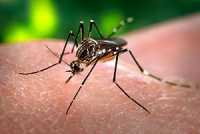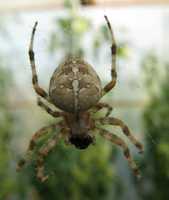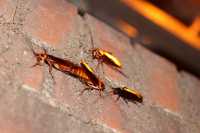Author Interviews, Dengue, PLoS, Zika / 04.02.2021
Odorless Emanators Can Passively Kill Disease-Bearing Mosquitoes in Endemic Areas
MedicalResearch.com Interview with:
Gregor J. Devine, Ph.D
Mosquito Control LaboratoryQIMR Berghofer Medical Research Institute
Brisbane, Queensland, Australia
MedicalResearch.com: What is the background for this study?
Scale of the problem: Dengue, Zika and chikungunya are all transmitted by the same mosquito species. That mosquito, Aedes aegypti, is superbly adapted to the human, urban environment – it lays its eggs and develops in the standing water that collects in the myriad containers associated with modern living (plastic bottles, food packaging, buckets, planters, crumpled tarpaulins etc.). Unusually they rely almost entirely on human blood for their nutritional requirements and they subsequently bite multiple times during each egg laying cycle. That reliance on human blood means that they are usually found resting indoors, a behaviour that also offers them some protection from weather extremes and predators. Once infected, and having incubated the virus until it is transmissible, a mosquito that survives for just a couple of weeks can infect many humans within the same and neighbouring households.
In poorer tropical urban environments with dense human populations, unscreened houses, no air-conditioning, and innumerable rain-filled containers to develop in, Aedes aegypti proliferates and so do those diseases, causing ca 400M annual infections of dengue alone by some estimates. The economic impact of the dengue, which normally causes a high fever, muscle and joint pains and nausea, is pronounced; especially in poor households with few savings and no welfare system. Every year, about 500,000 of those dengue cases develop into severe dengue, or dengue haemorrhagic fever (typified by plasma leakage, severe bleeding and organ impairment). There are about 25,000 deaths annually.
 The Zika pandemic of 2015-2016 resulted in 1000s of babies born with microcephaly and damage to their brains and eyes. For 1000s of other children, the impacts of Zika on their cognitive development did not manifest in their first, formative years. Chikungunya is endemic in Asia and Africa but between 2010 and 2014, outbreaks and epidemics spread across the Indian Ocean, the Caribbean, the Americas and the Pacific Islands. It causes severe, often debilitating joint pain in infected patients. Those affected also suffer from headaches, fever, severe muscle pain and conjunctivitis. Joint pain can persist in subacute or chronic form for several months or even years, particularly in older patients. The ubiquity of the mosquito Aedes aegypti across the tropics and sub tropics ensures that further epidemics of Zika and chikungunya will occur, outside their usual ranges. It’s simply impossible to predict when that will occur.
(more…)
The Zika pandemic of 2015-2016 resulted in 1000s of babies born with microcephaly and damage to their brains and eyes. For 1000s of other children, the impacts of Zika on their cognitive development did not manifest in their first, formative years. Chikungunya is endemic in Asia and Africa but between 2010 and 2014, outbreaks and epidemics spread across the Indian Ocean, the Caribbean, the Americas and the Pacific Islands. It causes severe, often debilitating joint pain in infected patients. Those affected also suffer from headaches, fever, severe muscle pain and conjunctivitis. Joint pain can persist in subacute or chronic form for several months or even years, particularly in older patients. The ubiquity of the mosquito Aedes aegypti across the tropics and sub tropics ensures that further epidemics of Zika and chikungunya will occur, outside their usual ranges. It’s simply impossible to predict when that will occur.
(more…)
 The Zika pandemic of 2015-2016 resulted in 1000s of babies born with microcephaly and damage to their brains and eyes. For 1000s of other children, the impacts of Zika on their cognitive development did not manifest in their first, formative years. Chikungunya is endemic in Asia and Africa but between 2010 and 2014, outbreaks and epidemics spread across the Indian Ocean, the Caribbean, the Americas and the Pacific Islands. It causes severe, often debilitating joint pain in infected patients. Those affected also suffer from headaches, fever, severe muscle pain and conjunctivitis. Joint pain can persist in subacute or chronic form for several months or even years, particularly in older patients. The ubiquity of the mosquito Aedes aegypti across the tropics and sub tropics ensures that further epidemics of Zika and chikungunya will occur, outside their usual ranges. It’s simply impossible to predict when that will occur.
(more…)
The Zika pandemic of 2015-2016 resulted in 1000s of babies born with microcephaly and damage to their brains and eyes. For 1000s of other children, the impacts of Zika on their cognitive development did not manifest in their first, formative years. Chikungunya is endemic in Asia and Africa but between 2010 and 2014, outbreaks and epidemics spread across the Indian Ocean, the Caribbean, the Americas and the Pacific Islands. It causes severe, often debilitating joint pain in infected patients. Those affected also suffer from headaches, fever, severe muscle pain and conjunctivitis. Joint pain can persist in subacute or chronic form for several months or even years, particularly in older patients. The ubiquity of the mosquito Aedes aegypti across the tropics and sub tropics ensures that further epidemics of Zika and chikungunya will occur, outside their usual ranges. It’s simply impossible to predict when that will occur.
(more…)

 Yaakov Hoffman, PhD.
Senior Lecturer and Clinical Psychologist
Interdisciplinary Department of Social Sciences
Max & Anna Webb St. Ramat-Gan, Israel, 5290002
MedicalResearch.com: What is the background for this study?
Foundation: This study was conceptualized during a conversation we had, namely, Dr. Yaakov Hoffman, Interdisciplinary department of social sciences, Bar Ilan University, and Professor Menachem Ben-Ezra School of Social Work, Ariel University, following the release of the Antman movie. We are both psychologists who are also avid Marvel superhero fans. In this meaningful conversation we discussed the issue of fear of insects which led to the idea that positive exposure to phobic stimuli (exposure to spider or ants) within the context of Marvel superheroes will lead to robust reduction in phobic symptoms. As most of the conventional treatments for specific phobias use exposure to the phobic stimuli in neutral contexts, we thought that framing the exposure in a positive fun, albeit fantasy context would yield robust results, as well as perhaps reducing stigma.
Yaakov Hoffman, PhD.
Senior Lecturer and Clinical Psychologist
Interdisciplinary Department of Social Sciences
Max & Anna Webb St. Ramat-Gan, Israel, 5290002
MedicalResearch.com: What is the background for this study?
Foundation: This study was conceptualized during a conversation we had, namely, Dr. Yaakov Hoffman, Interdisciplinary department of social sciences, Bar Ilan University, and Professor Menachem Ben-Ezra School of Social Work, Ariel University, following the release of the Antman movie. We are both psychologists who are also avid Marvel superhero fans. In this meaningful conversation we discussed the issue of fear of insects which led to the idea that positive exposure to phobic stimuli (exposure to spider or ants) within the context of Marvel superheroes will lead to robust reduction in phobic symptoms. As most of the conventional treatments for specific phobias use exposure to the phobic stimuli in neutral contexts, we thought that framing the exposure in a positive fun, albeit fantasy context would yield robust results, as well as perhaps reducing stigma.
